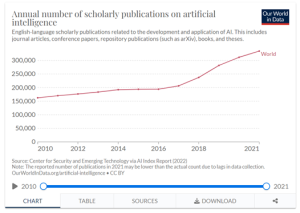Some tips for academic librarians wanting to make sense of AI
This the first in a series of posts about Collections as Data, AI, computational approaches to Arts and Humanities, signposting to resources, networks, reports and events
How should academic libraries respond to the maturing of Artificial Intelligence? Analysis of recent interviews with five librarians at research intensive universities in the UK suggests that collection-holding universities should pursue strategies for publishing their collections as data. The interviews sought to validate the outcomes of some previous work (see the report, Is AI for Me?).
The interviews show that librarians are challenged by the speed at which AI is developing. Getting the right information to support decision making is challenging in an environment where there is such rapid change and so much diffuse information (see fig 1). It is therefore better to focus on what libraries are good at, providing verified information in support of research, learning and teaching.

Knowledge sharing to address overload
A good way of overcoming information overload is by building knowledge-sharing networks. A prime example of this is the AI4LAM initiative where libraries archives and museums come together in a network to learn together how best to apply these technologies but also how to respond to their increasing prevalence; a response that needs to be effective and in line with institutional mission. See the Responsible Operations report (Padilla, 2019) for why working together to meet the challenges of AI and data-centric scholarship is so important. It is also worth noting Machine Actionable Data, Cordell 2020 and Machine Actionable Collections, Padilla 2019).
Thinking about Collections as Data
It is unclear to what extent the concept of Collections As Data (CaD) has affected academic libraries in the UK. We are excited to note that the valuable work started in 2016 as part of the Always Already Computational project (Padilla et al 2019) is being refreshed.
Recently, representatives of 18 nations gathered in Vancouver, Canada to explore Collections as Data: State of The Field and Future Directions. We look forward to the resulting updated Santa Barbara Statement on Collections as Data and the report on the outcomes of the gathering.
UK implementations of Collections as Data
Libraries have always been cautious about releasing their collections and rightly so. The National Library of Scotland’s Data Foundry is built on solid principles of providing standards based structured data but it is also a trail blazing initiative, providing one model for making historic collections available as data. Our work will continue to explore if there are ways that institutions, with less resources, might partake in making their collections available in similar ways.
Labs as a way of engaging with data and computation
We have seen libraries across the globe starting to make the digital shift (see the RLUK’s Digital Shift forum) by establishing digital labs, though it is not clear to what extent this is impacting all research oriented academic libraries, especially those with more limited resources.
A good example of a hub approach is the University of Southampton’s newly established Digital Humanities Hub which acts as a conduit between faculty, students, the library and the wider DH community. This hub is discussed in a forthcoming Jisc Research Talk podcast. We have just published our first AI focused episode of the podcast, The highs and lows of artificial intelligence, with Professor Melissa Terras from the University of Edinburgh, which examines the critical issues around the use of artificial intelligence (AI) in humanities scholarship.
Jisc’s Archives Hub has undertaken its own lab efforts which you can follow through the AI and IIIF series of posts on the Archives Hub blog.
AI and collections management
Thomas Padilla recently posted Getting Started with Machine Learning and GLAM (Galleries, Libraries, Archives, Museums) Collections, a highly informative blog post on using AI to support collection management tasks. The post also advertises that Internet Archive and Hugging Face will have an online hackathon planned for later in the year, so that may be something to look out for.
What else?
Finally, it is useful to keep and eye on our own Centre for AI in Tertiary Education which explores wider institutional issues related to AI.
We will organise some events in the autumn and develop a small number of institutional case studies, so keep an eye on this blog for more information on libraries, archives, collections as data and computational approaches to Arts and Humanities data.

One reply on “Investigating the uses of AI in libraries and for humanities research”
[…] train their own models? It may well be part of the answer but, following the argument made in the preceding post, perhaps a simpler, less resource intensive, starting point would be to find mechanisms for […]